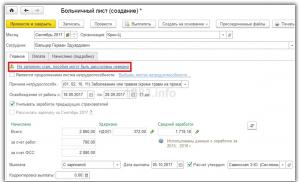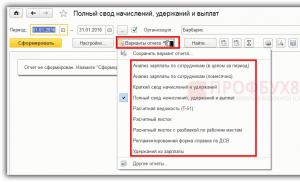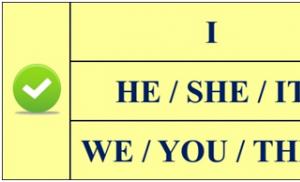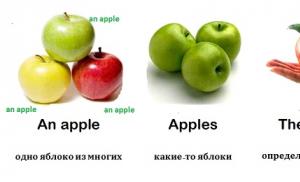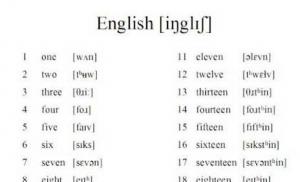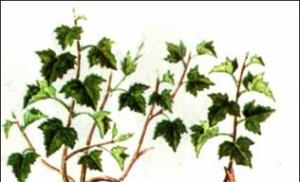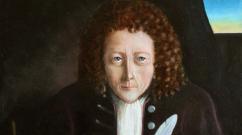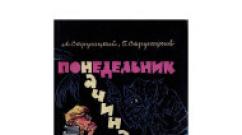Databases for searching information about WWII participants on the Internet. Nikolai Vladimirovich Stefanovich: poetry Memorial of the Great Patriotic War
We have been keeping the memory of the Great War of the 20th century and its heroes for more than 70 years. We pass it on to our children and grandchildren, trying not to lose a single fact or surname. Almost every family was affected by this event; many fathers, brothers, husbands never returned. Today we can find information about them thanks to the painstaking work of military archives staff and volunteers who devote their free time to searching for soldiers’ graves. How to do this, how to find a WWII participant by last name, information about his awards, military ranks, place of death? We could not ignore such an important topic, we hope that we can help those who are looking and want to find.
Losses in the Great Patriotic War
It is still unknown exactly how many people left us during this great human tragedy. After all, the counting did not begin immediately; only in 1980, with the advent of glasnost in the USSR, historians, politicians, and archive staff were able to begin official work. Until this time, scattered data that were beneficial at that time were received.
- After celebrating Victory Day in 1945, J.V. Stalin said that we had buried 7 million Soviet citizens. He spoke, in his opinion, about everyone, both about those who died during the battle and about those who were taken prisoner by the German occupiers. But he missed a lot, did not say about the rear employees who stood at the machine from morning until night, falling dead from exhaustion. I forgot about the sentenced saboteurs, traitors to the motherland, ordinary residents and siege survivors of Leningrad who died in small villages; missing persons. Unfortunately, they can be listed for a long time.
- Later L.I. Brezhnev provided different information, he reported 20 million dead.
Today, thanks to the decoding of secret documents and search work, the numbers are becoming real. Thus, you can see the following picture:
- Combat losses received directly at the front during battles amount to about 8,860,400 people.
- Non-combat losses (from illnesses, wounds, accidents) - 6,885,100 people.
However, these figures do not yet correspond to complete reality. War, and even this kind of war, is not only the destruction of the enemy at the cost of one’s own life. These are broken families - unborn children. This is a huge loss of the male population, thanks to which it will not soon be possible to restore the balance necessary for good demography.
These are diseases, hunger in the post-war years and death from it. This is rebuilding the country again, again in many ways, at the cost of people’s lives. All of them also need to be taken into account when doing calculations. All of them are victims of terrible human vanity, whose name is war.

How to find a participant in the Great Patriotic War 1941 - 1945 by last name?
There is no better memory for the stars of victory than the desire of the future generation to know. The desire to save information for others, to avoid such repetition. How to find a WWII participant by last name, where to find possible information about grandfathers and great-grandfathers, fathers who took part in battles, knowing their last name? Especially for this purpose, there are now electronic repositories that everyone can access.
- obd-memorial.ru - here contains official data containing reports of units about losses, funerals, trophy cards, as well as information about rank, status (died, was killed or disappeared, where), scanned documents.
- moypolk.ru is a unique resource containing information about home front workers. The very ones without whom we would not have heard the important word “Victory”. Thanks to this site, many have already been able to find or help find lost people.
The work of these resources is not only to search for great people, but also to collect information about them. If you have any, please report it to the administrators of these sites. In this way, we will do a great common cause - we will preserve memory and history.

Archive of the Ministry of Defense: search by last name of WWII participants
Another one is the main, central, largest project - https://archive.mil.ru/. The documents preserved there are mostly isolated and remained intact due to the fact that they were taken to the Orenburg region.
Over the years of work, CA staff have created an excellent reference apparatus showing the contents of archival accumulations and funds. Now its goal is to provide people with access to possible documents through electronic computing technology. Thus, a website has been launched where you can try to find a military man who participated in the Second World War, knowing his last name. How to do it?
- On the left side of the screen, find the “memory of the people” tab.
- Indicate his full name.
- The program will give you the available information: date of birth, awards, scanned documents. Everything that is in the files for a given person.
- You can set a filter on the right, selecting only the sources you want. But it's better to choose everything.
- On this site it is possible to look at military operations on a map and the path of the unit in which the hero served.
This is a unique project in its essence. There is no longer such a volume of data collected and digitized from all existing and available sources: card files, electronic memory books, medical battalion documents and command directories. In truth, as long as such programs and the people who provide them exist, the memory of the people will be eternal.
If you didn’t find the right person there, don’t despair, there are other sources, maybe they’re not as large-scale, but that doesn’t make them any less informative. Who knows in which folder the information you need might be lying around.

Participants of the Second World War: search by last name, archive and awards
Where else can you look? There are more narrowly focused repositories, for example:
- dokst.ru. As we said, those who were captured also became victims of this terrible war. Their fate may be displayed on foreign websites like this one. Here in the database there is everything about Russian prisoners of war and the burials of Soviet citizens. You only need to know the last name, you can look at the lists of captured people. The Documentation Research Center is located in the city of Dresden, and it was he who organized this site to help people from all over the world. You can not only search the site, but also send a request through it.
- Rosarkhiv archives.ru is an agency that is an executive authority that keeps records of all government documents. Here you can make a request either online or by phone. A sample electronic appeal is available on the website in the “appeals” section, left column on the page. Some services here are provided for a fee; a list of them can be found in the “archive activities” section. With this in mind, be sure to ask whether you will need to pay for your request.
- rgavmf.ru - a naval reference book about the destinies and great deeds of our sailors. In the “orders and applications” section there is an email address for processing documents left for storage after 1941. By contacting the archive staff, you can get any information and find out the cost of such a service; most likely it is free.

WWII awards: search by last name
To search for awards and feats, an open portal has been organized, dedicated specifically to this www.podvignaroda.ru. Information is published here about 6 million cases of awards, as well as 500,000 unawarded medals and orders that never reached the recipient. Knowing the name of your hero, you can find a lot of new things about his fate. The posted scanned documents of orders and award sheets, data from registration files, will complement your existing knowledge.
Who else can I contact for information about awards?
- On the website of the Central Election Commission of the Ministry of Defense, in the section “Awards are looking for their heroes”, a list of awarded soldiers who did not receive them was published. Additional names can be obtained by phone.
- rkka.ru/ihandbook.htm - encyclopedia of the Red Army. It published some lists of the assignment of senior officer ranks and special ranks. The information may not be as extensive, but existing sources should not be neglected.
- https://www.warheroes.ru/ is a project created with the aim of popularizing the exploits of the defenders of the Fatherland.
A lot of useful information, which sometimes is not found anywhere, can be found on the forums of the above sites. Here people share valuable experiences and tell their own stories that can help you too. There are many enthusiasts who are ready to help everyone in one way or another. They create their own archives, conduct their own research, and can also be found only on forums. Don't shy away from this type of search.

WWII veterans: search by last name
- oldgazette.ru is an interesting project created by ideological people. A person who wants to find information enters data, it can be anything: full name, name of awards and date of receipt, line from a document, description of an event. This combination of words will be calculated by search engines, but not just on websites, but in old newspapers. Based on the results, you will see everything that was found. Maybe this is where you will be lucky, you will find at least a thread.
- It happens that we search among the dead and find among the living. After all, many returned home, but due to the circumstances of that difficult time, they changed their place of residence. To find them, use the website pobediteli.ru. This is where people searching send letters asking for help in finding their fellow soldiers, random encounters during the war. The project's capabilities allow you to select a person by name and region, even if he lives abroad. If you see it on these lists or similar, you need to contact the administration and discuss this issue. Kind, attentive staff will definitely help and do everything they can. The project does not interact with government organizations and cannot provide personal information: telephone number, address. But it is quite possible to publish your search request. More than 1,000 people have already been able to find each other this way.
- 1941-1945.at Veterans do not abandon their own. Here on the forum you can communicate, make inquiries among the veterans themselves, perhaps they have met and have information about the person you need.
The search for the living is no less relevant than the search for dead heroes. Who else will tell us the truth about those events, about what they experienced and suffered. About how they greeted victory, the very first, the most expensive, sad and happy at the same time.

Additional sources
Regional archives were created throughout the country. Not so large, often standing on the shoulders of ordinary people, they have preserved unique individual records. Their addresses are on the website of the movement to perpetuate the memory of the victims. And:
- https://www.1942.ru/ - “Seeker”.
- https://iremember.ru/ - memories, letters, archives.
- https://www.biograph-soldat.ru/ - international biographical center.
Database
www.podvignaroda.ru
www.obd-memorial.ru
www.pamyat-naroda.ru
www.rkka.ru/ihandbook.htm
www.moypolk.ru
www.dokst.ru
www.polk.ru
www.pomnite-nas.ru
www.permgani.ru
Otechestvort.rf, rf-poisk.ru
rf-poisk.ru/page/34
soldat.ru
memento.sebastopol.ua
memory-book.com.ua
soldat.ru - a set of reference books for independently searching for information about the fate of military personnel (including a directory of field postal stations of the Red Army in 1941-1945, a directory of the code names of military units (institutions) in 1939-1943, a directory of the location of Red Army hospitals in 1941-1945 years);
www.rkka.ru - a directory of military abbreviations (as well as regulations, manuals, directives, orders and personal documents of wartime).
Libraries
oldgazette.ru – old newspapers (including those from the war period);
www.rkka.ru – description of military operations of the Second World War, post-war analysis of the events of the Second World War, military memoirs.
Military cards
www.rkka.ru – military topographic maps with the combat situation (by war periods and operations).
Search Engine Websites
www.rf-poisk.ru is the official website of the Russian Search Movement.
Archives
www.archives.ru – Federal Archive Agency (Rosarkhiv);
www.rusarchives.ru – industry portal “Archives of Russia”;
archive.mil.ru – Central Archive of the Ministry of Defense;
rgvarchive.ru
rgaspi.org
rgavmf.ru – Russian State Archive of the Navy (RGAVMF). The archive stores documents of the Russian Navy (late 17th century - 1940). Naval documentation of the Great Patriotic War and the post-war period is stored in the Central Naval Archive (CVMA) in Gatchina, which is under the jurisdiction of the Russian Ministry of Defense;
victory.rusarchives.ru – a list of federal and regional archives of Russia (with direct links and descriptions of collections of photo and film documents from the period of the Great Patriotic War).
Partners of the Stars of Victory project
www.mil.ru – Ministry of Defense of the Russian Federation.
www.histrf.ru – Russian Military Historical Society.
www.rgo.ru – Russian Geographical Society.
", "Russian Female");" type="button" value="🔊 Listen to the news"/>!}
Database
www.podvignaroda.ru – a publicly accessible electronic bank of documents on recipients and awards during the Great Patriotic War of 1941-1945;
www.obd-memorial.ru - a generalized data bank about defenders of the Fatherland, those killed and missing during the Great Patriotic War and the post-war period;
www.pamyat-naroda.ru is a publicly accessible data bank about the fate of participants in the Great Patriotic War. Search for places of primary burials and documents about awards, service, victories and hardships on the battlefields;
www.rkka.ru/ihandbook.htm – awarded the Order of the Red Banner in the period from 1921 to 1931;
www.moypolk.ru - information about participants in the Great Patriotic War, including home front workers - living, dead, dead and missing. Collected and replenished by participants in the all-Russian action “Immortal Regiment”;
www.dokst.ru – information about those killed in captivity in Germany;
www.polk.ru – information about Soviet and Russian soldiers missing in action in the wars of the 20th century (including the pages “The Great Patriotic War” and “Undelivered Awards”);
www.pomnite-nas.ru – photographs and descriptions of military graves;
www.permgani.ru – database on the website of the Perm State Archive of Contemporary History. Includes basic biographical information about former servicemen of the Red Army (natives of the Perm region or called up for military service from the territory of the Kama region), who during the Great Patriotic War were surrounded and (or) captured by the enemy, and after returning to their homeland underwent special state inspection (filtration);
Otechestvort.rf, rf-poisk.ru – electronic version of the book “Names from Soldiers’ Medallions”, volumes 1-6. Contains alphabetical information about those killed during the war whose remains, discovered during search operations, were identified;
rf-poisk.ru/page/34 / – books of memory (by regions of Russia, with direct links and annotations);
soldat.ru – books of memory (for individual regions, types of troops, individual units and formations, about those who died in captivity, those who died in Afghanistan, Chechnya);
memento.sebastopol.ua – Crimean virtual necropolis;
memory-book.com.ua – electronic book of memory of Ukraine;
soldat.ru - a set of reference books for independently searching for information about the fate of military personnel (including a directory of field postal stations of the Red Army in 1941-1945, a directory of the code names of military units (institutions) in 1939-1943, a directory of the location of Red Army hospitals in 1941-1945 years);
rgvarchive.ru – Russian State Military Archive (RGVA). The archive stores documents about the military operations of the Red Army units in 1937-1939. near Lake Khasan, on the Khalkhin Gol River, in the Soviet-Finnish War of 1939-1940. Here are also documents of the border and internal troops of the Cheka-OGPU-NKVD-MVD of the USSR since 1918; documents of the Main Directorate for Prisoners of War and Internees of the USSR Ministry of Internal Affairs and institutions of its system (GUPVI Ministry of Internal Affairs of the USSR) for the period 1939-1960; personal documents of Soviet military leaders; documents of foreign origin (trophy). On the archive's website you can also find guides and reference books that make working with it easier.
rgaspi.org – Russian State Archive of Socio-Political Information (RGASPI). The period of the Great Patriotic War in RGASPI is represented by documents of an emergency body of state power - the State Defense Committee (GKO, 1941-1945) and the Headquarters of the Supreme Commander-in-Chief;
Nikolai Vladimirovich Stefanovich was born on January 6, 1912 in the family of an employee, Vladimir Mitrofanovich Stefanovich (d. 1916). Mother, Olga Petrovna (d. 1947), was a teacher. The family also had three daughters. After graduating from school, the poet studied at the Higher Literary Courses in Moscow; before they were closed and dispersed, he managed to complete 3 courses. He studied on the course together with the future director of the House-Museum F.I. Tyutchev in Muranova K.V. Pigarev. Already in his youth, Tyutchev’s work had a great influence on him; Stefanovich devoted research to him; out of love for him, he met the famous poet and literary critic G.I. Chulkov. After the courses were closed, Nikolai Vladimirovich entered the Shchukin Theater School, and after graduating, he worked at the Vakhtangov Theater for eight pre-war years.
I cannot help but mention a sad episode in the life of Stefanovich, which was widely disseminated by literary critic Vitaly Shentalinsky, who published the book “Denunciation of Socrates” in 2001. In the chapter dedicated to the fate of M.A. Voloshin, the author, among other things, devotes several pages to the court case of the Christian poetess Natalia Anufrieva and mathematician Daniil Zhukovsky, who were arrested in Moscow in the summer of 1936. He also writes that the arrest of the latter occurred on the denunciation of Nikolai Stefanovich. Without whitewashing Stefanovich, I still want to say that not everything is completely clear about the details of this case. Most likely, this was not a denunciation, but a confession extracted from the poet during the investigation. The poet was close friends with Anufrieva and Zhukovsky for several years; it was a circle of young truth-seekers and Christian-minded intellectuals. And they most likely met through Chulkov, since Zhukovsky was married to the latter’s sister Anna. I think someone else wrote the denunciation. Another person appeared in the case, a classmate of Daniil Zhukovsky at the Faculty of Mathematics of Moscow State University, who was released from any responsibility and no longer appeared in the case. Stefanovich was apparently blackmailed by his family into appearing as a witness at the trial of Zhukovsky and Anufrieva in April 1937. From the pressure he suffered, he became seriously ill, and subsequently experienced deep mental anguish from the fact that he was unable to show the proper measure of fortitude. Here I can only remember the gospel truth as old as time - “Judge not, lest ye be judged.” It is not at all the business of poets to defend their convictions, proving in the office of NKVD investigators that they are right. Their job is to write good poetry.
In 1941, a bomb hit the theater where Stefanovich was on duty. The poet was seriously wounded and became disabled for life, receiving the 1st group of disability.
That same year, he and the theater evacuated to Perm. After returning to Moscow, he continued to work in the theater for some time. Soon I met B.N. Slutsky, who really liked Stefanovich’s poems and translations. Slutsky recommended him for admission to the section of translators at the State Publishing House, and until the end of his days Nikolai Vladimirovich was professionally engaged in translations: primarily of Eastern poets, in particular Rabindranath Tagore, as well as translations from East Slavic languages. Stefanovich himself knew the languages of the peoples of Yugoslavia quite well, since his father was a Serb. His translations were actively published, many of them were published in the pages of the journal "Foreign Literature".
The poet died on April 14, 1979, and was buried at the Vagankovskoye cemetery in Moscow. Stefanovich's original work was practically not published during his lifetime. Through the mediation of Slutsky, 3 small publications were published in the anthology “Poetry Day”. This was, of course, connected with their religious content. Only in the perestroika years did publications appear on the pages of Ogonyok, Rural Youth, Novy Mir, Smena and other publications. The author of this preface was directly related to some of these publications.
Nikolai Vladimirovich STEFANOVICH: poetry
Poet: | | .
IN MEMORY OF THE FATHER
I was left with you as an inheritance,
Did you expect to repeat it forever?
The world was shining, spread apart and raised,
Giving room to your imaginations,
***
How unmistakably and accurately
When they bomb for a week straight,
Pressed against the drainpipe,
Suddenly you know God!
The houses are crooked in horror,
Chills and fainting itching,
And my fingers are slippery...
- Russia!
Do you hear the angels singing?
***
What you lost teases you
And you are sad, dumbfounded,
When they sing on this holiday
Still the same festive tune.
Then you grew up, now you grow up
Now you're exhausted, and yet
Every time you enter the choir,
You are moving towards the past.
Your interrupted childhood
Stop at the Royal Gates -
After all, there is no other way in the world,
To bring him back.
***
O Russia, like Job in the Bible,
You've been stripped to the bones,
And the bottomless abyss of destruction
Yours shines in every puddle.
Both people and angels have changed,
They desecrate and hit me in the face...
This is how, if you believe the Gospel,
The prodigal son returned to his father.
***
O separation of Alpha and Omega!
Vainly and uncontrollably again
All night in the steppe a forgotten cart
Shafts will extend to the stars.
And the bewitched stars listen,
What do the frogs call them in a sing-song voice?
And at that hour they will fall to the ground,
I could not endure the separation of the evil.
Will all times merge then?
Behold the sound of a trumpet, sounding in the midst,
Connects worlds, spaces, distances
And what was, with what is ahead.
Yes, Lord, come! We're so tired
We are waiting for you. - Yes, Lord, come!
***
Sunset field. How gentle and quiet it is here!
Grasshoppers tick dreamily in the grass.
And if we multiply the grass for eternity,
They will be designated by the name of God;
The earth retreated and only remained
And I pray to God, a simple man:
“Oh, if only it would remain like this forever!”
But this moment goes somewhere,
And the whole sky is filled with the pain of separation.
***
Everyone who suffered, got sick,
Having lost everything to the end, -
Knows that this destruction
The Father was not in the house.
All those who have squandered everything,
Gloomily engulfed in darkness,
Childish quality will help out -
Longing to return home.
***
Not everyone can stand it for a moment,
And I had a chance to check it out:
It is full of melancholy, burning thirst
And eternity, solemn to the point of tears, -
Of that eternity that one day
Christ compared it to a mustard seed.
***
From these walls. from gossip and insults
Somewhere to hide, even in a dream.
After all, I feel sick all day long
Swollen, cold palate.
The shabby garden is overgrown with unconsciousness.
Chills and itching. By the wet barn
The rough noise of shabby birches,
Leaky yard and crooked street.
And this is the land that Christ
I wanted to save you by raising you from the dead.
***
I am gripped by an unbearable horror,
Shapeless and black, like a hole,
Only because your baptismal cross
I accidentally lost it today.
After all, there is no God and the devils are made up,
And angels are not visible above,
And the cross disappeared. And therefore, with death
I was left completely alone.
***
It seemed like I was ruining my soul,
And the load is terrible, and there is no way,
But the cross sparkled over the old church,
Almost invisible in the darkness.
And above the church fence
Big clouds are flying
And suddenly inspiring and delighting,
And a heavy burden is light...
MORNING
Now there are not a single board in the fences
You still can’t call it a board
And you won’t stop crossing your hand -
So the morning streets are easy
And the Orthodox sky is like that.
Know God, who is clear through and through,
Bye to portfolios, theses and books,
Things haven't been closed yet
His face revealed too much.
***
Now I'm weak and old
But just like in childhood - at the balcony
A pensive mosquito hangs
On the thread of its own ringing.
And also everything down to the smallest detail,
To every crack on the saucer...
When I hear: "Boy! Hey!" -
I can't help but look back.
***
The board will swing - we'll fly
Towards the sky, roofs, pine trees...
The bicycle was three-wheeled,
And the garden is huge and dense.
I came, having warped my soul,
To the last edge, to the border,
But I’m entering childhood early,
How to enter the festive church.
***
Lord! The beginning of it all!
Was there such a moment
If only I wouldn't bother you
Am I endlessly sad with my longing?
Only once was there an evening full of energy,
So transparent and good
And I thanked you
Laughing and clapping...
To relieve heavy guilt
My sins, deceptions, nonsense -
I'll start right here
When will I be the last to appear in court?
***
The foliage will rustle and recoil,
The trees will close closer...
Where does this temperament come from?
At the stars, mignonette, poplars?
Mysterious herbs and leaves.
Everything froze, the rustling died down,
And I feel that the Eucharist is here,
And I hear: Yours from Yours...
***
June night insinuating bliss,
A chant heard once in childhood.
In the foggy steppe a cart prays,
Raised the shafts to the starry sky.
And about the One Who seemed to be absent -
I realized here, in the mown meadow,
That He moves the planet like this for everyone,
I can’t even move an eyebrow.
Everything is magical: bushes, straw, stone
And the blood pounding in my temple,
And "Our Father" sung by crickets
In a language that people don't understand.
Frosty, windy and bare,
In all worlds, in every region
Holy memory, O Nikola,
Today they celebrate yours.
And in this hour of praise and glory,
By the light of a melting candle,
How to become not dark, not crafty,
Teach me how not to die.
PRODIGAL SON
And he told them the following parable...
Luke 15:3
1
In the blue and dense garden
How I want to live endlessly,
When through the shaggy branches
The father's smile will break through.
And now the air is healing,
And the comfort of the paths is bright,
And your constant prayer service
Grasshoppers sing in the grass.
And the boy is a resinous thicket
Taking a running breath, he takes a deep breath,
And the light coming from the father,
It burns in the soul, like in a lamp.
And, squeezing my heart with my palms,
He is ready to cry with happiness...
After all, this is both now and forever,
After all, this is forever and ever.
2
The father is unrestrained and generous
And days and nights long
All yourself to the water and wind,
Gives to flowers and herbs.
And these butterflies and bees,
And these branches are the substance -
Only the embodiment of cheerful thoughts
And his various inventions.
But immediately containing everything,
He himself does not know the orbits,
And only his shadow is big
Sometimes it glides through the greenery.
3
Children's clothes are tight and not suitable for their size,
And the boy rushes about, awkward and gloomy.
He thinks confusingly
and it doesn’t just feel
Everything is out of place and at random.
He loved swings
but meager and fearless
Flying on a leash
which is useless...
Now at a snail's pace
All this seems to him.
4
Told my father:
-I was sent to myself.
I still love your bright home,
I'll leave anyway.
To become an adult from now on,
I will separate from you today.
Maybe I'm awkward and naive
But I'll find my own
limit…-
And he left. And a terrible surge came
shower,
And I didn’t want to calm down until the morning.
5
In space cut and flat
Everything changed and flowed.
He stood in front of the kiosk,
I touched the cloudy glass.
Then chaos broke out again -
Shaggy, tangled, thick...
And this was all accompanied
Some strange nausea.
6
Perhaps he is in battle, in a duel?
And suddenly I remembered clearly again,
Like a wheel on a sunny path
He tried to overtake his own shadow.
No, don't look, don't see, don't touch,
Cover everything with a curtain of rain...
It's stupid to bite yourself by the elbow
Or bang your head against the wall.
7
The yard is languishing, down to dirty logs
The night sky is down.
How the sweet smell is sinful,
Like the stifling wicked wind...
And the bedroom windows appear
And someone's feminine balcony,
Where even the air is catarrhal,
Where even the darkness is inflamed.
In the soul - like in an abyss, like in a well,
But he runs, swallowing the darkness,
And every house laughs at him
And they applaud him.
8
The alarm bell rings in my soul without a break...
Who invented that the will is not strong?
Here's a boy crossing the street
Here's an old man and an old man's cough.
How mysterious and subtle everything is now:
Another invisible push -
And the truck will run over the child,
And, like a candle, the old man will go out.
His fire, swift and stifling,
Eternal destruction lies within itself,
Sliding like a knife near the vital aorta
Any destiny, any existence.
And if he doesn't overcome temptation,
And if the soul is overcome by sin,
It will be devilishly dangerous -
For the old man, for the boy, for everyone.
9
Will the gray old man die,
Or someone else will die, -
Arithmetic is important for nature:
She is neither cold nor hot.
And when from a fragrant dress
Golden grace will breathe in, -
Someone will pay with their lives for this,
Someone suddenly stops breathing.
10
He is crazy and neurasthenic...
Again dawn, losing shame,
Empty streets will be stripped,
The kinks of the stairs will be exposed.
And through the early morning collodion
Now it seems to him that
That someone won't take him away again
Your glassy eyes.
11
Now go and don’t look back...
How all the houses and windows are symmetrical!
Just think: people are sleeping,
- Everything is as usual.
And then the damp dawn took him by surprise,
And it’s scary to look into the entrances and gates...
Perhaps it's true at this moment
Did someone die suddenly?
12
Loneliness. Splashes and slush.
The rain stopped and started pouring again.
As if the sky was trying not to cry,
But she couldn’t restrain herself.
Like someone's big grievances
Became wind, fog, rain...
Or is it the forgotten father
Does he remember his son?
13
The trumpet sings as if in a funeral march.
And again dawn...
During this night he became much older,
For hundreds of years.
Let the soul, in abscesses and growths,
Almost dead...
Everything is so easy, so infinitely simple.
Everything is tryn-grass.
14
The plants became dry
And hardened like metal
When the father's holy name
He desecrated and trampled.
The stars have faded. Everything in the world
Suddenly, mortal fear seized me,
And it was heard in the houses
Frightened children scream.
15
Medicines don't save people
A terrible disease is raging,
And the black kingdom of hunger,
Like the sea, it rages around.
There are corpses lying everywhere.
He is both ashamed and scared...
Knock on someone's window,
Just so you don't have to be alone?
16
Sometimes the look is almost random,
It means almost nothing.
Isn't that right, master?
Did you look at it for the first time?
Above the dark brick outbuilding
The sky was streaked blue...
He looked at him a second time,
And they were very symmetrical
His transparent eyes.
17
And he said: -You are a brave fellow,
You don't care about duty and shame.
Herd my pigs, perhaps...
After all, your father acted naughtily
He will never forgive you.
And he grazes in the damp lowlands
The pigs of their lord, -
He became completely see-through and blue,
And the triumphant pigs
They look at him with mockery.
18
How the blade cuts
In the temples and in the chest,
And tears and gnashing
More to come.
And somewhere in abundance
Cooking for him
Brutal torture
And eternal darkness.
Nobody's angry
Stronger than father...
Torment and screams
There will be no end.
But thunder and executions
He is not afraid:
They are safer
A different silence.
And great horror
Ready to take cover -
And in moans and screams,
And the gnashing of teeth.
Into the impenetrable darkness,
And where else?
Death, and that's okay.
That's all. And the Sabbath.
19
Looking for shorter roads,
Walking with a bitten lip
And he repeats: - how, father,
Will I appear in front of you?
He is ready for severe retribution,
But suddenly, through the morning space,
Father chaotic embrace
I stretched it out towards him.
20
No reproaches, no anger, no rage.
The clouds embrace him
And the father through the hot thickets
He pours out his glee.
The shell is simple and rough
Doesn't interfere with anything anymore
And the trees rustle like banners,
Rushing towards him.
And it sparkles hotter and more solemnly
The blue of the wide open eternity...
This is life's second coming,
This is a holiday holiday. Amen.
*
Almost bordering on fantasy,
Contrary to plausibility, -
This parable has lived for centuries,
An ancient creation of Luke.
Or perhaps this is not heresy,
That light, invisible just like that,
We comprehend only through
Blames, unconsciousness and darkness?
Let the universe freeze
And turn into end-to-end steam, -
To save everything, about the prodigal son
One chapter is enough.
About a Person: Evgeny Yevtushenko about Nikolai Stefanovich
Nikolai Vladimirovich STEFANOVICH (1912-1979)- poet: | | .
From Evgeny Yevtushenko’s anthology “Ten Centuries of Russian Poetry”
Once, in the early sixties, I found Boris Slutsky with a lean, reserved man about the age of my father. The stranger looked at me with searching curiosity, but did not even try to be friendly. It was felt that he had no time for it. There was a clear shadow of some kind of internal pain on his face. He was already leaving and introduced himself, pronouncing his last name Stefanovich with an emphasis on the “e,” which was somewhat unusual.
Is he one of the rehabilitated? - I asked Slutsky.
No,” Boris answered, “he never sat.” But back in 1937, as a witness, he testified at a trial against two of his friends and still cannot forgive himself. But people are too cruel: they don’t want to remember how these testimonies were extracted. Not necessarily torture. After all, everyone’s family is hostage. And his mother was alive and his sisters...
What does he do?
Actually, he is an actor, graduated from the Shchukin School, and before the war he served at the Vakhtangov Theater. In 1941, during a raid, he was on duty on the roof of the theater and was wounded. Became a disabled person of the first group. True, they kept him in the theater, but they gave him only minor roles. He earns extra money, like Desik Samoilov and I, by doing translations at Goslit. On his father’s side he is Serbian and knows the language, he does without interlinear translations. He also writes his own poetry, but he has never published it before. When I read it, I was amazed. Such poets do not lie on the road. In any case, he is the author of one brilliant quatrain. Even if he had not written anything else, it would have been enough to remain in poetry forever.
And Boris Abramovich read four lines, which I have often repeated since then. I hope that both my children and their children’s children will repeat them. Here is this great quatrain, sounding more and more modern and poignant, when the fate of the entire globe depends on what happens even in the tiniest countries:
A single lot binds everyone:
All you have to do is twist your leg -
And at the same moment in Addis Ababa
Someone will scream in pain.
In the book “Denunciation of Socrates” (2001), Vitaly Shentalinsky, whom I deeply respect for his research into Stalin’s atrocities, provides indisputable evidence of Stefanovich’s collaboration with the NKVD, citing his detailed denunciation of the poets Natalya Anufrieva and Daniil Zhukovsky. But I cannot believe that a man who wrote so many kind and strong poems was an informer of his own free will. Surely he became a victim of a merciless meat grinder, a cunning inquisitorial blackmail. I don’t justify him, but I don’t want to throw another stone at him: in my opinion, he punished himself most severely with pangs of conscience. Perhaps, in his thoughts about everything that happened, he wrote his poetic confession dedicated to “Memory of the Father”:
I was left with you as an inheritance,
A cut strand of your hair.
What about our toy childhood?
Did you expect to repeat it forever?
The world was shining, spread apart and raised,
Giving room to your imaginations,
And because I'm disgusting today,
Not only for me, but for both of us.
And because there is no limit to shame,
And because it happened that way, -
Suddenly the medallion turned gray
A brown strand of your hair.
As a deeply religious person, Nikolai Stefanovich lived with a feeling of the impending Apocalypse. And the war unleashed by the Nazis was for him a harbinger of the Last Judgment:
Isn’t that why it’s so creepy?
Isn’t that why the tanks went berserk?
What time has come when the archangel
The graves will be able to open.
Will we understand in the fire and smoke
Of today's war -
What other battles
Are we surrounded at this moment?
He became a tragic participant not only in this Second World War, but also in that eternal endless war of good and evil, whose battlefield is every human soul.
In Stefanovich's poems one can see a man who is entangled in the nets of lies and fear - a man forced to betray his friends, but essentially kind and gentle, not born a traitor, but broken by the shameless rapists of his own people. And was he alone in the sin imposed on him! But at least he repented, and not everyone had the conscience to do so...
Look how much sensitivity, gratitude and sorrow there is in the soul of this sufferer crippled by both wars:
The stars will get tangled in the bushes again,
Shaking leaves and dew from the branches.
Oh, whatever You, Lord, create now -
I will not make any amendments to anything.
You have illuminated the surroundings in a new way,
Everything is permeated through and through by you...
And only the dead can rise again
And that night it failed again.
And what crystal laconicism in the longing for the ideal:
The time will come to fall asleep for the last time,
Pitch darkness will close over me,
And they will turn into a through cloud
Houses, and days, and branches under the window, -
And I’m scared of what’s most earthly
I will lose my longing for the unearthly...
Leaving this life purified by repentance, Nikolai Stefanovich could hope for our understanding and sympathy, for that same mercy, which, as we know, is higher than justice.
It so happened that one day the demon also beguiled Slutsky. Inertial fear from the Stalin era, and even reinforced by his party affiliation, pushed him to the only shameful act in his life: at a general meeting of Moscow writers, he joined the rabid vilification of Boris Pasternak. But, like Stefanovich, Slutsky subsequently openly admitted his tragic guilt:
Angelic, not automotive
I was hit by a wing.
He subjected himself to seclusion and sentenced himself to not writing poetry. Not everyone does this.
Both poets did not try to justify their guilt. They recognized her and redeemed her with self-punishment. Let's forgive them.
LET'S FORGIVE
When my mother came from the Lubyanka archives,
She was silent and did not get into quarrels with the past.
She buried her face in the pillow for a week.
And there she lay. The eyes did not look at people.
And then she said:
“Don't go there.
All the signatures there are not for black hair and lard.
I'm sorry grandpa.
It’s not even fear, it’s pain that signed it.”
Let's forgive those who survived interrogation nights,
when they pulled out their nails with pliers.
Let's forgive
having repented not in an ostentatious way, but in the most Christian style.
Let's forgive
everyone who has not forgiven themselves,
thinking about one's own conscience, not prestige.
Let's forgive
Let souls not become like scorched deserts.
Let's forgive
everyone who has not forgiven themselves.
Let's forgive them with simple, simple words,
but not so that, having betrayed again, they ask for forgiveness,
and without hinting that they will forgive us in the future too
for the fact that we raised new traitors with softness towards cowards.
This will be the kind of Russia I want...
Evgeniy EVTUSHENKO
S. Golomyskino, Novonikolayevskaya Governorate - March 31, Novosibirsk Region) - assistant platoon commander of the 7th rifle company of the 227th rifle regiment of the 175th Ural-Kovel rifle division of the 47th army of the 1st Belorussian Front, senior sergeant - at the time submissions for the Order of Glory, 1st degree.
Biography
Born on December 15, 1924 in the village of Golomyskino (now Toguchinsky district of the Novosibirsk region). After graduating from school, he worked on a collective farm.
In August 1942 he was drafted into the Red Army. Since March of the same year at the front. From the first day until the Victory, he fought as part of the 227th Infantry Regiment of the 175th Infantry Division. The combat biography of the Red Army soldier Starodubtsev began at the Kursk Bulge.
Scout Starodubtsev earned his first award, the medal “For Courage,” in battles on Right Bank Ukraine in January 1944. Six months later, in the battles near Kovel, he received a second medal “For Courage”. By this time, he had been behind enemy lines more than once, participated in many reconnaissance searches, and was wounded twice. He particularly distinguished himself in the battles for the liberation of Poland.
On September 13, 1944, Private Starodubtsev acted as part of a reconnaissance group in the Warsaw suburb of Prague. The fighters, penetrating deep into the city at night, secretly surrounded a large stone house, which the Nazis had turned into a stronghold. They threw grenades at the windows and after a short fight they captured him. In this battle, the scouts destroyed up to a platoon of enemy infantry, and seven opponents were captured. Their actions ensured the advancement of the remaining divisions of the division deeper into the city. By order of the commander of the 175th Infantry Division dated October 5, 1944, private Nikolai Filippovich Starodubtsev was awarded the Order of Glory, 3rd degree, for the courage and bravery shown in battle.
As a result of four days of fighting, Soviet troops captured Prague. Favorable conditions were created for crossing the Vistula and providing assistance to the rebels of Warsaw. The reconnaissance group of the 175th Infantry Division received the task of penetrating behind enemy lines, reconnaissance of its defense system and capturing the “tongue”. On October 10, 1944, the scouts crossed to the western bank of the Vistula and penetrated deep into enemy defenses. Having captured the prisoner, they began to return and went straight to the enemy patrol. In the battle, Starodubtsev destroyed an enemy sentry and a machine gun crew. When the officer, commander of the reconnaissance group, was wounded, Starodubtsev carried him to the eastern bank. Then he returned to the group and covered the retreat. Being wounded, he was the last to leave the enemy-occupied shore. By order of the 47th Army troops of November 1, 1944, private Nikolai Filippovich Starodubtsev was awarded the Order of Glory, 2nd degree, for saving the commander and successfully completing the command’s assignment.
In mid-January 1945, Soviet troops went on the offensive. The Vistula-Oder operation began. On the night of January 16, scouts led by Sergeant Starodubtsev crossed the Vistula across the ice, broke into an enemy trench, and with grenades destroyed four heavy machine guns with crews and about two platoons of enemy infantry. Having taken four prisoners and captured valuable documents, the scouts delivered them to the regiment commander. Then they rushed forward again, deep into the enemy defenses. The main forces of the regiment entered the bridgehead captured by the scouts. From this bridgehead the division began its attack on Warsaw.
By decree of the Presidium of the Supreme Soviet of the USSR of May 31, 1945, for courage and courage shown in the battles for Warsaw, senior sergeant Nikolai Filippovich Starodubtsev was awarded the Order of Glory, 1st degree. Became a full holder of the Order of Glory.
In 1945, N.F. Starodubtsev was demobilized. Returned to his homeland. Lived in the village of Zavyalovo, Toguchinsky district, Novosibirsk region. First he worked as a foreman on a collective farm, then as a foreman on a state farm. But soon old wounds opened up and I had to retire. Died on March 31, 1964.
Awarded Orders of Glory of 3 degrees and medals.
